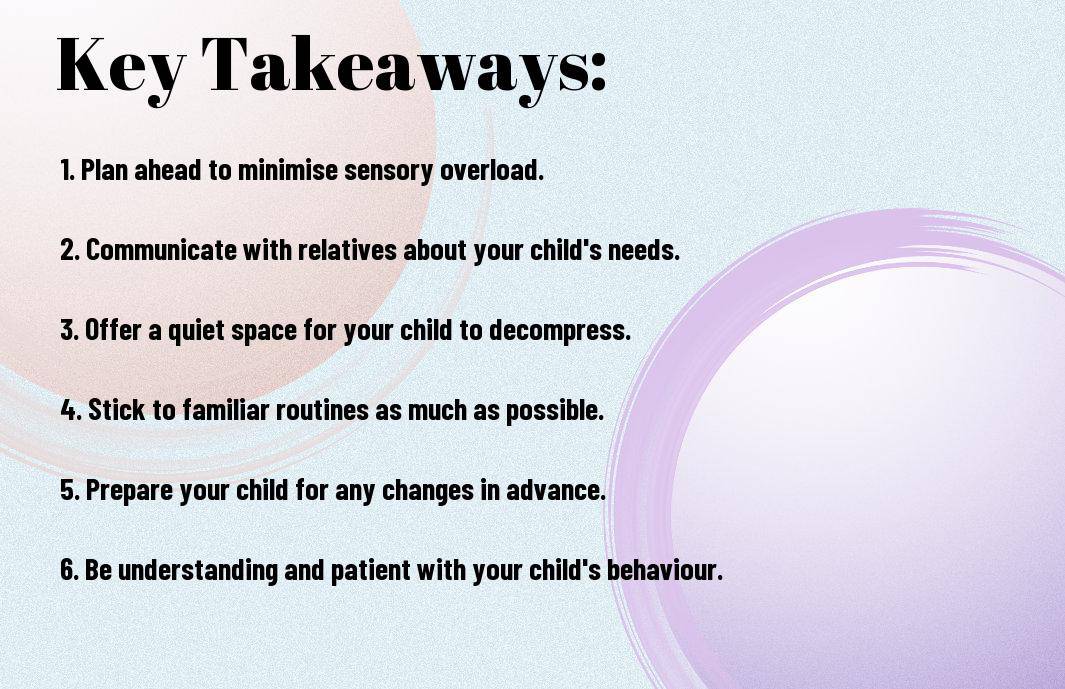It can be a challenging task to navigate the holiday season with an autistic child. The overstimulation from crowded gatherings, changes in routine, and sensory overload can lead to meltdowns and increased stress for both the child and their family. However, with careful planning and preparation, it is possible to create a positive and enjoyable experience for everyone involved. In this informative blog post, we will discuss strategies for managing holiday events, communicating with family members about your child’s needs, and finding inclusive activities that cater to your child’s unique preferences and sensitivities. By implementing these tips, you can ensure that the holiday season is a time of joy and celebration for your autistic child, as well as the entire family.
Key Takeaways:
- Be mindful of sensory triggers: Autistic children may be sensitive to lights, sounds, and textures. Look for ways to minimize sensory overload during holiday events.
- Plan ahead and establish routines: Create a visual schedule for holiday activities and stick to familiar routines whenever possible to provide a sense of security and predictability for the child.
- Communicate with family and friends: Educate loved ones on the child’s needs and preferences, and set realistic expectations for social interactions to reduce stress for both the child and the family.


Preparing for the Holidays
As the holiday season approaches, it’s important to take proactive steps to ensure that your autistic child feels comfortable and supported during this potentially overwhelming time. Preparation is key to navigating the holidays with ease, and there are several strategies that can help you and your child enjoy this special time of year.
Communication Strategies
Effective communication is essential for helping your autistic child navigate the holidays. Be clear and specific in your communication, and consider using visual aids or social stories to prepare your child for upcoming events and changes in routine. Establishing a communication plan with family members and friends can also help them understand your child’s needs and preferences.
Creating a Comfortable Environment
Creating a comfortable environment can greatly reduce stress and anxiety for your autistic child during the holidays. Designate a quiet space where your child can retreat if they become overwhelmed, and consider using sensory tools such as noise-cancelling headphones or weighted blankets to provide comfort and security.
Additionally, maintaining familiar routines as much as possible can help your child feel grounded and secure amidst the excitement and chaos of the holiday season.
Holiday Gatherings
Holiday gatherings can be both exciting and overwhelming for families with autistic children. It’s important to prepare your child for these occasions to ensure a positive experience for everyone. For tips on how to navigate holiday celebrations and family get-togethers with an autistic child, check out this resource on Preparing your child with autism for holiday celebrations and family get-togethers.
Managing Sensory Overload
During holiday gatherings, sensory overload can be a real challenge for autistic children. The combination of bright lights, loud noises, and unfamiliar surroundings can be overwhelming. It’s important to create a quiet space where your child can retreat if they need a break. This could be a designated room or area with sensory-friendly activities to help them regulate. Being proactive in managing sensory overload is crucial for ensuring your child feels comfortable and supported during holiday gatherings.
Inclusive Activities and Traditions
When planning holiday activities and traditions, consider your child’s needs and preferences. Include activities that cater to their interests and sensory sensitivities, and communicate with family members about the importance of incorporating inclusive practices. For example, if your child struggles with large group activities, consider opting for smaller, more intimate gatherings or individualised activities. Adapting traditions to make them more inclusive for your child can contribute to a more positive holiday experience for the entire family.
It’s important to find a balance between maintaining cherished family traditions and accommodating your child’s needs. By incorporating inclusive practices and activities, you can create a holiday environment that is enjoyable and supportive for your autistic child.
Traveling Tips
Travelling with an autistic child during the holidays can be challenging, but with careful planning and consideration, it can also be a rewarding experience for the whole family. Here are some tips to help make the journey as smooth as possible:
- Plan in advance and inform your child about the trip
- Prepare a travel schedule and visual aids
- Consider sensory needs and pack comfort items
- Be prepared for unexpected changes
Handling Transitions and New Places
Children with autism can find transitions and unfamiliar places particularly challenging. It’s important to prepare your child for the journey by creating a visual schedule and using social stories to explain what to expect. On arrival, allow your child plenty of time to acclimatise to the new surroundings, and be prepared to provide additional support if needed. Remember to remain patient and calm, as your child will pick up on your emotions.
Strategies for Long Journeys and Visits
For long journeys, it’s essential to prepare your child by using visual aids to explain the journey and what to expect upon arrival. Take regular breaks to allow your child to stretch and regulate their sensory input. Additionally, communicate with family members or hosts at your destination to ensure they are aware of your child’s needs and can make necessary accommodations.
When visiting new places, it can be beneficial to carry items that provide sensory relief for your child, such as noise-cancelling headphones or a favourite blanket. Establish a quiet space where your child can retreat if they become overwhelmed, and encourage them to take breaks as needed. By carefully planning for the journey and considering your child’s specific needs, you can help to make the experience a positive and enjoyable one for everyone involved.

Maintaining Routines and Coping Techniques
Importance of Structure During the Festive Season
During the festive season, maintaining routines and coping techniques becomes even more crucial for parents of autistic children. The excitement, noise, and change in schedule can be overwhelming for them, leading to increased anxiety and potential meltdowns. Structure and predictability are key to helping autistic children navigate through the holidays without feeling overwhelmed.
By adhering to a consistent daily routine, parents can provide a sense of stability and security for their autistic child. This may involve setting regular meal times, bedtime routines, and scheduling quiet time for relaxation. Establishing clear expectations and communicating any changes in advance can also help in reducing anxiety and ensuring a smoother transition during the festive period.
Relaxation and Downtime
Amidst the hustle and bustle of the holidays, it’s important to incorporate relaxation and downtime into the daily schedule for an autistic child. Creating a quiet and calm environment can provide them with the opportunity to decompress and recharge, helping to prevent sensory overload and emotional exhaustion.
Engaging in calming activities such as listening to music, reading a book, or sensory play can offer a much-needed break from the sensory stimulation of the festive season. Parents should also be mindful of their child’s individual needs and recognise when they may need some time alone to regulate their emotions and feel more at ease.
For example, providing a designated ‘quiet space’ where the child can go to when feeling overwhelmed can be a valuable tool in managing stress levels and promoting relaxation during the holiday period.
Conclusion: Navigating the Holidays with an Autistic Child
In conclusion, navigating the holidays with an autistic child can present unique challenges, but with the right strategies and support, it can also be a meaningful and enjoyable experience for the whole family. By planning ahead, maintaining a familiar routine, and providing clear communication, parents can help their autistic children feel more comfortable and secure during the holiday season. It’s important to be patient and understanding, and to seek out resources and guidance when needed. For more tips on preparing children with autism for the holidays, you can refer to 16 Ways to Prepare Children with Autism for Holidays.
FAQ
Q: How can I help my autistic child navigate the holiday season?
A: It is important to create a predictable schedule and communicate changes in advance to help your child navigate the holiday season successfully.
Q: What are some strategies for managing sensory overload during holiday gatherings?
A: Providing a quiet space for your child to retreat to, using noise-canceling headphones, and bringing familiar sensory items can help manage sensory overload during holiday gatherings.
Q: How can I prepare my autistic child for social events during the holidays?
A: Prepare your child by talking about the event in advance, practicing social skills, and developing a plan for when social interactions become overwhelming.
Q: What should I consider when planning holiday travel with an autistic child?
A: Consider your child’s sensory needs, prepare them for the journey with visual supports, and communicate any special requirements to travel providers in advance.
Q: How can I involve my autistic child in holiday traditions and activities?
A: Adapt traditions to suit your child’s needs, create visual schedules for activities, and involve your child in the planning process to ensure they feel included and comfortable.
Q: What should I do if my autistic child becomes overwhelmed during the holidays?
A: Have a quiet space available, use calming techniques, and be prepared to leave if necessary to help your child manage overwhelm during the holidays.
Q: How can I support my autistic child during gift-giving and receiving?
A: Help your child understand the concept of gift-giving and practice opening and receiving gifts, communicate any sensitivities or preferences to gift-givers, and offer support during potentially overwhelming experiences.







